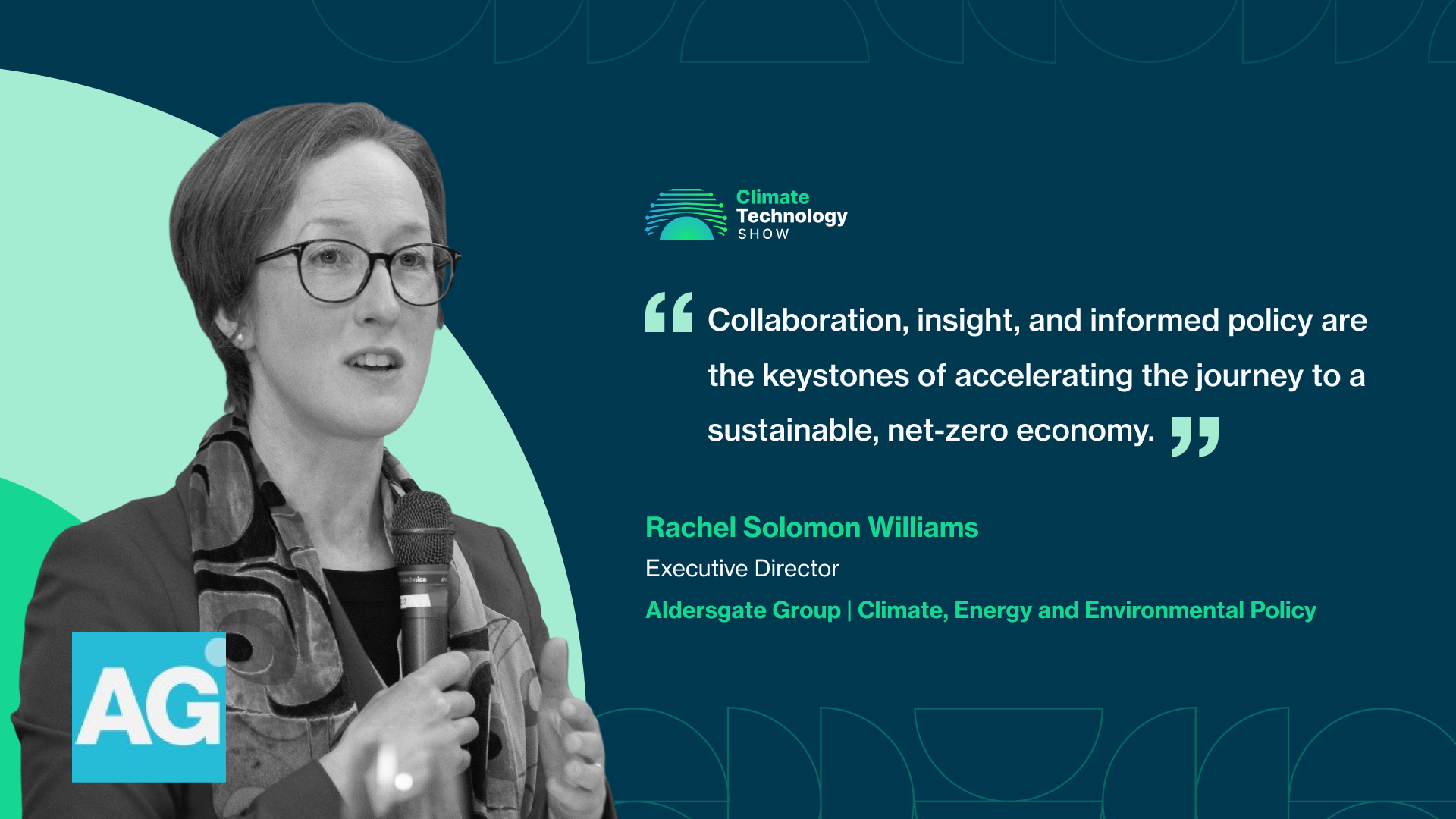Since mid-2023 Rachel Solomon Williams has been Executive Director at the Aldersgate Group, a cross-sectoral alliance of businesses and other organisations championing a prosperous, environmentally sustainable economy. Rachel has 23 years’ experience of working in environment and climate policy, as a civil servant (including as policy lead on the Climate Change Act) and in the private and third sectors. Drawing on this experience, she works with Aldersgate Group members to develop robust recommendations and press the Government for change in vital areas across climate and environment policy.
In this engaging Q&A session, she shares her insights on driving policy change towards a net zero, environmentally sustainable economy. She discusses the power of cross-sector collaboration, the importance of credible, evidence-based advocacy, and how the Aldersgate Group leverages its unique position to influence policy, support business action, and accelerate the UK’s climate transition. Rachel also reflects on the role of platforms like the Climate Technology Show in shaping the future of green innovation and effective policymaking.
#Shaheen: Could you describe your position at the Aldersgate Group and explain how your efforts help shape autonomous policy solutions that lead the shift to a net zero, environmentally sustainable economy?
#Rachel: I am Executive Director at the Aldersgate Group, which means I’m responsible for the Group’s overall direction, policy positioning, membership engagement, advocacy approach and organisational management. The Group’s members include businesses, academic institutions and green NGOs, and we work with them to make the case for accelerating action on climate change and nature restoration. We do this by analysing the opportunities to businesses from environmental action, based on our members’ real-world experiences, and using this evidence base to describe how government policies can help to unlock those opportunities most effectively.
#Shaheen: How does your organisation leverage its role as an official accelerator to the Race to Zero campaign to drive tangible progress in achieving a resilient, zero-carbon economy?
#Rachel: Our status as a membership organisation means we are well placed to build momentum across the economy as part of the Race to Zero. We do this by fostering information-sharing between members and with other organisations, by building confidence among businesses to take ambitious action, and by generating insights which contribute to supportive policymaking.
#Shaheen: With a membership of diverse composition representing large corporations, NGOs, and universities, could you provide an example of cross-sector collaboration yielding a successful policy solution or substantive progress in environmental sustainability?
#Rachel: In 2024 we produced a report called Why Nature Matters for Business which exemplifies our approach to developing insights. It brings together a deep understanding of why nature is important, and what actions are needed for its restoration, with analysis of where the risks and opportunities are for businesses considering their engagement with nature. This report has been widely welcomed and is influencing Defra’s current review of the UK Environmental Improvement Plan.
#Shaheen: What are the approaches that your organisation takes to interact with policymakers and respond to consultations, and how do these activities contribute to influencing well-forward planning, coherent legislation tackling the UK’s climate and environmental issues?
#Rachel: We start by developing insights based on our members’ experiences: this gives our recommendations credibility when we discuss them with policymakers. We then interact in a range of ways with civil servants, ministers and Parliamentarians more widely, through bilateral conversations, roundtables and larger events, as well as through written consultation responses and reports. Often we involve Group members with those discussions, enabling us to bring our recommendations to life most effectively.
#Shaheen: How do you envision the Climate Technology Show promotion dialog among policymakers and innovators to shape the policy reforms required to speed up our shift towards a sustainable, net-zero economy?
#Rachel: The Show will bring together players from right along the climate technology value chain, facilitating vital collaboration and information-sharing between companies and organisations that might not otherwise have that opportunity. By showcasing best practice and highlighting barriers and opportunities, it will help both businesses and policymakers to make well-informed decisions.

